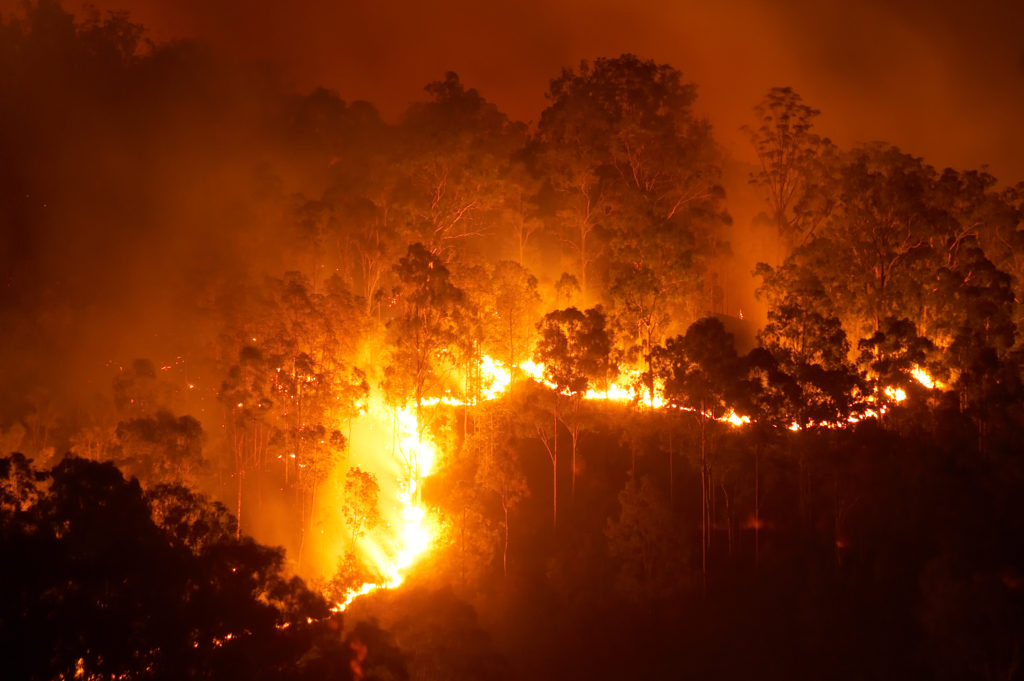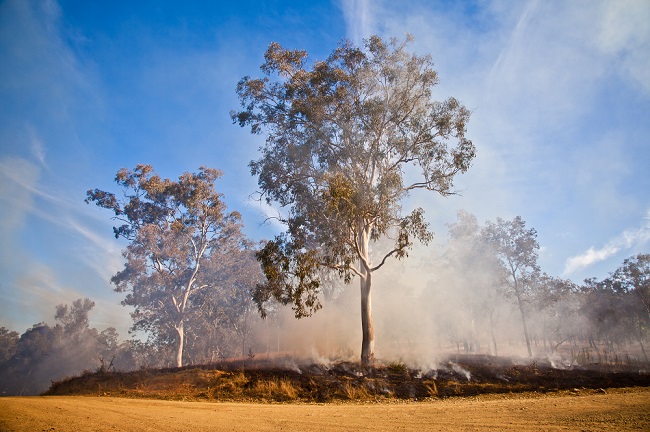At the end of August 2020 both the Final Report of the NSW Bushfire Inquiry and Interim Observations of the Royal Commission into National Natural Disaster Arrangements (known as the Bushfire Royal Inquiry) were released.
With the 2020-21 fire season already commenced in Queensland, and due to commence shortly in NSW and Victoria, EDO looks back on six months of recovery and reflection and forward to a future of increasing extreme fire weather in a changing climate.
EDO’s response in February 2020 to the bushfire emergency >>
NSW Bushfire Inquiry
In April 2020, EDO lodged a submission to the NSW Bushfire Inquiry. We focused on the key environmental drivers of bushfires, principally climate change, and how these should be addressed in ecologically sustainable, science-based laws, regulations and strategies to protect life and property and the environment from the impacts of bushfires.
EDO’s submission to the NSW Bushfire Inquiry is available here.
On 25 August 2020, the NSW Government released the findings of the NSW Bushfire Inquiry and accepted all 76 recommendations of the Final Report. While media headlines focused on recommendations to increase and compel hazard reduction burns, the findings and recommendations of the Final Report were more balanced than that. Amongst the Inquiry’s findings, were conclusions that:
- The 2019-20 bushfire season was extreme and extremely unusual. It showed that bushfires through forested regions were on a scale not seen in Australia in recorded history, and fire behaviour took experienced firefighters by surprise;
- A number of factors combined to make this season extraordinary. Climate change as a result of increased greenhouse gas emissions clearly played a role in the conditions that led up to the fires and in the unrelenting conditions that supported the fires to spread, but climate change does not explain everything that fire season challenged conventional assumptions. For example, it appears that the extreme dryness of forested regions over large continuous areas was the determining factor in the size of the fires. When taken together with the weather conditions experienced, the fires became extreme, burning through forests and across bare earth; and
- Previous prescribed burning and hazard reduction activity appears to have reduced fire severity in some instances, but in others it appears to have had no effect on the severity and spread of the fires.1
Recommendations made by the Inquiry covered a range of considerations, including:
- checking and auditing processes;
- improving accountability;
- improving safety equipment and systems for firefighters;
- putting more emphasis on getting fires out early;
- improving backburning protocols, training and information around heavy plant use;
- ensuring the right mix of aerial firefighting assets;
- increased aerial night firefighting;
- improved telecommunications;
- advances in research and technology especially fire science, remote sensing, data science and artificial intelligence;
- improved government systems;
- more strategic land use planning to account for bushfire;
- better managing of critical infrastructure including fire trails and roads to minimise property and asset damage;
- improving local preparedness and resilience;
- enhanced community education; and engagement; and
- individual and community ownership of risk.
EDO will analyse implementation of the recommendations of the Inquiry to ensure that any changes to environmental laws made off the back of the inquiry are ecologically sustainable and based on the best available science. Following significant bushfire events, perceived tensions between conservation, asset protection and disaster preparedness present risks of ‘maladaptation’ and can lead to perverse outcomes. We do not support environmentally destructive, unsubstantiated practices introduced under the guise of bushfire management.

Bushfire Royal Commission
The Royal Commission into National Natural Disaster Arrangements (known as the Bushfire Royal Commission) was established in February 2020 in response to the extreme bushfire season of 2019-20 which resulted in loss of life, property and wildlife and environmental destruction. The Royal Commission received more than 1,700 public submissions. It published Interim Observations on 31 August 2020 and is due to deliver its final report by 28 October 2020.
EDO’s submission to the Royal Commission into National Natural Disaster Arrangements is available here. Our submission considers national climate and environment legal frameworks, and makes recommendations for strengthened, ecologically sustainable, science-based laws, regulations and strategies to protect life and property and the environment from the impacts of bushfires and other natural disasters.
The Royal Commission’s Interim Observations make numerous observations with respect to:
- National coordination and accountability arrangements;
- National information systems;
- Opportunities for improvements in national mitigation and preparedness arrangements;
- Opportunities for improvements in national response arrangements; and
- Opportunities for improvements in national recovery arrangements.2
In terms of land management and wildlife protection, the Interim Observations state that:
- Land management can reduce some aspects of natural disaster risk (eg, through vegetation fuel management). However, the effectiveness of land management depends in turn on a range of factors, particularly weather. There are also a number of constraints that limit the extent of, and opportunities for, land management, including cost, community awareness, regulatory settings, and the shortening of seasonal windows;
- There is a strong interest in, and views on, prescribed burning as a bushfire hazard reduction activity. Other activities include mechanical clearing—such as slashing, thinning and mowing—and grazing by animals. All these activities can play an important role in ameliorating bushfire behaviour and increase the potential for suppression. However, these activities will not eliminate bushfire risk. There is a need for further education and research to improve understanding of the effectiveness of these activities under severe to catastrophic bushfire weather conditions;
- There is a place for Indigenous land and fire management practices to be integrated into the planning and execution of public land management activities across Australia;
- Land use planning and building decisions are a key factor in the extent of exposure, and vulnerability, of households and communities to natural hazards. However, there are gaps in the natural disaster risk information available to decision makers;
- Improving knowledge of the impacts of natural disasters on wildlife could support the rapid deployment of wildlife triage and rehabilitation efforts. There remain significant information gaps for more effective wildlife management and species conservation. These are challenging to fix immediately; and
- The 2019-2020 bushfires have highlighted the need for action to ensure greater consistency and collaboration in the collection, storage, access and provision of environmental information.3
We await the Royal Commission’s final report in October 2020 and the Government’s response. EDO will analyse the implications for land management, wildlife and biodiversity conservation across Australia.

Working with the community
EDO has continued to work with the community in its recovery from the devastating fires, and in taking action to ensure more is done to address the impacts a changing climate, including an increased risk of extreme fire weather and severe fire danger.
For example:
- Through our advice line, we continue to respond to calls from clients concerned about the impact of the bushfires on Australian wildlife, and further threats posed by activities already approved, or currently being assessed for approval, at the State, Territory and Federal levels.
- EDO’s Special Counsel, Dr Emma Carmody, and ANU Professor, Dr Jamie Pittock, were guests on the ClimateReady Podcast, discussing the 2019-20 Australian bushfire season, including how climate change, ongoing drought, and specific governance and management policies all worked in conjunction to feed the conditions for such devastating fires – listen here.
- EDO is acting for Bushfire Survivors For Climate Action, a group of people from around NSW, who have experienced first-hand the devastation caused by major bushfires, in bringing legal action to force the New South Wales Environmental Protection Authority to address climate change – read more.
- EDO assisted the Manyana Matters Environmental Association in its efforts to protect one of the last pieces of unburnt bushland in Manyana on the NSW South Coast from a 180 lot residential subdivision development. After commencing proceedings in the Federal Court our client was successful in securing an undertaking from the proponent, OzyHomes, to give two weeks’ notice to our client prior to commencing any work. The proposed development has now been referred by the proponent to the Federal Minister for a decision as to whether or not the project requires assessment under the EPBC Act – read more.
- Earlier in the year, Environmental Defenders Office, with Humane Society International (HSI), wrote to the Commonwealth Environment Minister and NSW and Queensland Premiers and Ministers outlining existing powers available to them to urgently protect threatened species and ecological communities affected by the fires from further harm, as the assessment of impacts continues.
Here are the responses we have since received in response to those letters:
- 1. Owens, D. and O’Kane, M. Final Report of the NSW Bushfire Inquiry, July 2020, available at https://www.nsw.gov.au/nsw-government/projects-and-initiatives/nsw-bushfire-inquiry
- 2. Royal Commission into National Natural Disaster Arrangements, Interim Observations, August 2020, available at https://naturaldisaster.royalcommission.gov.au/publications/interim-observations-1
- 3. Ibid.





